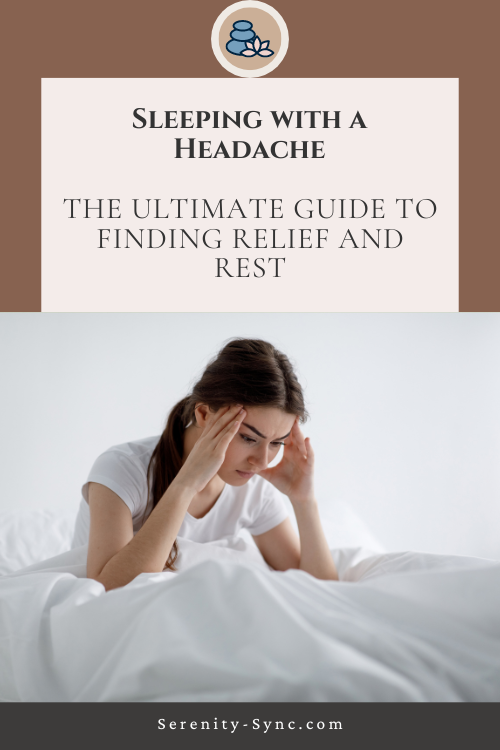In Brief
Struggling to sleep with a pounding headache? Don’t worry, we’ve got you covered! In this comprehensive guide, we’ll explore everything you need to know about sleeping with a headache. From the importance of sleep position to expert advice, pillow selection, and considering other health conditions, we’ve got all the tips and tricks to help you find relief and get a good night’s sleep. Say goodbye to sleepless nights and hello to headache-free slumber!

Your Free PDF version of this blog post Awaits – No Strings, Just Click and Enjoy! 🌸🎁
Importance of Sleep Position for Headache Relief
Trying to find a comfortable sleep position when you have a headache can be a real challenge. However, finding the right sleep position is crucial for relieving the pain and discomfort. When your head and neck are properly aligned, you can experience significant relief from headaches.
It’s essential to align your neck and spine to reduce the tension that often accompanies headaches. By doing so, you can alleviate the pressure on the nerves and muscles in your head and neck, ultimately reducing the severity of your headaches.
According to Dr. Diana Shadbehr, director of the Headache Clinic at Cedars-Sinai, finding a comfortable sleep position is an individual process. Experiment with different positions, such as sleeping on your side or back, to see which one provides the most relief for your headaches. Dr. Raj Dasgupta, a sleep doctor and assistant clinical professor at Keck School of Medicine of USC, also emphasizes the importance of spinal alignment in sleep position. By keeping your spine properly aligned, you can minimize the strain on your neck and prevent headaches.
So, the next time you have a headache, be sure to pay attention to your sleep position. It could make a world of difference in finding relief and getting a good night’s sleep.
Choosing the Perfect Pillow for Head and Neck Support
When it comes to finding relief from headaches, your choice of pillow plays a significant role. The right pillow can provide the necessary support for your head and neck, helping to alleviate the pain and discomfort associated with headaches.
It’s important to avoid using stacked or thick pillows that can overextend your neck, as this can lead to added strain and potentially worsen your headaches. Instead, opt for a pillow that keeps your head in a neutral position, aligning your neck and spine properly.
The type of pillow you choose also depends on your preferred sleep position. For example, if you sleep on your back, a pillow with medium to firm support can help maintain proper alignment. Side sleepers may benefit from a pillow with a higher loft to fill the space between the shoulder and neck. And if you sleep on your stomach, a flatter pillow can help prevent excessive strain on your neck.
To ensure you select the best pillow for headache relief, consider the recommendations of experts. Look for pillows that promote proper head and neck support, such as memory foam or latex pillows. These materials conform to your unique shape, providing customized support for headache relief.
Considering Other Health Conditions That Affect Sleep Position
Sleep position not only affects headaches but can also impact other health conditions, such as sleep apnea and snoring. It’s important to consider these conditions when trying to find the right sleep position for headache relief.
Research has shown a clear connection between sleep apnea, snoring, and sleep position. Sleeping on your back can exacerbate these conditions by causing the airway to become blocked, leading to interrupted breathing and poor sleep quality.
When managing sleep position with other health conditions in mind, it’s essential to seek expert advice. Consult with your healthcare provider for personalized insights on adjusting sleep position for specific conditions. They can provide guidance on finding the right balance between headache relief and overall health.
Remember, finding relief from headaches while also considering your overall well-being is crucial for a good night’s sleep.
Fun Fact
Did you know that poor sleep quality can actually increase the frequency and severity of headaches?
How Poor Sleep Worsens Headaches and Increases Their Frequency:
Poor sleep has a significant impact on the frequency and intensity of headaches. Studies have shown that sleep deprivation can trigger migraines and make existing headaches worse. When we don’t get enough restful sleep, our bodies become more susceptible to pain, and our pain tolerance decreases. Lack of sleep can also lead to increased muscle tension, which can contribute to headaches. Additionally, sleep deprivation disrupts the body’s natural pain-blocking mechanisms, making us more sensitive to pain signals. Therefore, improving sleep quality is crucial for managing headaches effectively.
Understanding the Relationship Between Sleep Quality and Headache Severity:
The quality of our sleep directly affects the severity of headaches. When we experience poor sleep, especially if it is due to factors like sleep apnea or snoring, our neck and spine alignment can be compromised, leading to headaches. Hyperflexion of the neck, which can occur when we sleep in certain positions, also puts strain on the neck and can contribute to headaches. It’s essential to pay attention to our sleep position, pillow support, and overall sleep routine to ensure optimal sleep quality and minimize headache severity.
Tips for Improving Sleep to Alleviate Headaches:
There are several steps we can take to improve our sleep and alleviate headaches. Creating a relaxing bedtime routine can signal our bodies that it’s time to sleep. This routine can include stretching before bed, practicing breathing exercises, and avoiding blue light from electronic devices. It’s also crucial to create a sleep environment that supports good-quality sleep. This includes investing in a pillow that provides proper support for the head and neck, ensuring our sleep position maintains spinal alignment, and addressing any sleep apnea or snoring issues that may be affecting our sleep quality.
Expert Advice on Creating the Right Sleep Environment:
To get expert insights on creating the right sleep environment, we turned to Dr. Diana Shadbehr, the director of the Headache Clinic at Cedars-Sinai, and Dr. Raj Dasgupta, a sleep doctor and assistant clinical professor at Keck School of Medicine of USC. According to Dr. Shadbehr, neck strain from poor sleep position can contribute to headaches. She recommends sleeping on your back or side instead of your stomach, as stomach sleeping can strain your neck. Dr. Dasgupta emphasizes the importance of pillow support for head and neck alignment and suggests investing in a pillow that provides adequate support based on your individual needs.
The Role of Good-Quality Sleep in Overall Headache Management:
Achieving good-quality sleep is essential for overall headache management. By improving sleep quality, we can reduce the frequency and severity of headaches. Good-quality sleep allows our bodies to rest and repair, reduces muscle tension, and supports healthy brain function. It also plays a crucial role in managing stress, which is a common trigger for headaches. Incorporating healthy sleep habits and creating the right sleep environment can significantly contribute to headache prevention and overall well-being.
Fun Fact
Studies have shown that certain scents, like lavender, can help relieve headache symptoms and promote better sleep.
Conclusion: Restful Nights and Headache-Free Mornings
In conclusion, the link between sleep and headaches is undeniable. Poor sleep worsens headaches and increases their frequency, while good-quality sleep plays a crucial role in headache management. By understanding the relationship between sleep quality and headache severity, implementing tips for improving sleep, and creating the right sleep environment, we can alleviate headaches and enjoy restful nights and headache-free mornings. So, prioritize your sleep and make the necessary changes to ensure you’re getting the quality rest your body needs. Your head will thank you!

